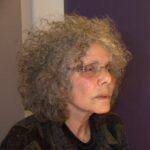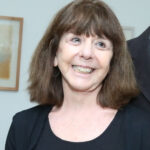Linda Zisquit Translation Folio: Poem by Hedva Harechavi
Translation from Hebrew
Something Most Like Happiness
I went crazy over the boy of stunning beauty who made the earth shudder, and is silent.
I went crazy over the dark whiskers that were piled up like weeds on his cheeks, and are silent.
I went crazy between the boney fingers of his hands, yellow from so much nicotine, wandering
round and round in my hair, and are silent. I went crazy in his arms, delighting on
my forehead, my eyelids, my cheeks, my neck, my nape, my shoulders, my belly,
my hips, my thighs, my knees. I went crazy in the fog at dusk,
at the foot of small volcanoes; there we passed an entire morning that will never end
of two lovers, wild with pleasure, drawing with colored chalk
on white Bristol board the pure beauty of their under-world
I went crazy precisely at the passageway, next to the beehives, in the garden, amazed at the sight.
I breathed when he breathed. I smiled when he smiled. I jumped when he jumped.
I shone when he shone. I was silent when he was silent. I descended when he descended.
I sank when he sank. I went on when he went on. Together we gathered
the vicissitudes of life, together we covered them in flowers, together we set down the old body
of the reality between white bushes, tiny ones, in back, next to the gate
of the old dogs’ kennel. Together we extinguished the time. A warm wind floated carefully
on his face that became covered with crumbled earth, bowing its head,
wiping the precious clods that protect his life
Already night. I extend my arms to the impossible, to him.
I went crazy in the absolute silence to look on the other side of the door, to see him sleeping
in his bed, waking, walking in his room, stretching, preparing coffee for himself, going out
to get some air, being friendly, playing, enjoying life, trying to remember, seeing in his imagination.
I went crazy with happiness hearing his voice – clear, pure, impatient, sparkling.
I went crazy in his eyes that started to cry
without knowing what life
would bring
משהו דומה לאושר
הִשְׁתַּגַּעְתִּי בְּנַעַר מֻכֵּה יֹפִי שֶׁצִּמְרֵר אֶת הָאֲדָמָה, וְשׁוֹתֵק
הִשְׁתַּגַּעְתִּי בַּזִּיפִים הַשְּׁחַרְחָרִים שֶׁנֶּעֶרְמוּ כַּעֲשָׂבִים עַל לְחָיָיו, וְשׁוֹתְקִים
הִשְׁתַּגַּעְתִּי בֵּין אֶצְבְּעוֹת יָדָיו צְהֻבּוֹת מֵרֹב נִיקוֹטִין מְשׁוֹטְטוֹת
סְחוֹר־סְחוֹר בְּשַׂעֲרוֹתַי, וְשׁוֹתְקוֹת, הִשְׁתַּגַּעְתִּי בִּזְרוֹעוֹתָיו, מִתְעַנְּגוֹת עַל
מצחי, על עַפְעַפַּי, עַל לחיי, עַל צַוָּארִי, עַל ערפי, עַל כְּתֵפַי, עַל בִּטְנִי,
עַל מָתְנַי, עַל יְרֵכַי, עַל ברכי. הִשְׁתַּגַּעְתִּי בָּעֲרָפֶל בִּשְׁעַת בין ערביים,
לְמַרְגְלוֹת הָרֵי־גַּעַשׁ קְטַנִּים; שם הֶעֱבַרְנוּ בֹּקֶר שָׁלֵם שֶׁלְּעוֹלָם לֹא יִגָּמֵר
שֶׁל שְׁנֵי נֶאֱהָבִים, גּוֹעֲשִׁים מִשִּׂמְחָה, מְצַיְּרִים בְּגִירִים צִבְעוֹנִיִּים עַל
ניירות בריסטול לָבָן אֶת הַיֹּפִי הַתָּמִים שֶׁל תַּחְתִּית הָעוֹלָם שֶׁלָּהֶם
הִשְׁתַּגַּעְתִּי בְּדִיּוּק בַּמַּעֲבָר, כָּאן, על-יד הכוורות, בגינה, משתאה למראה
.נָשַׁמְתִּי כְּשֶׁהוּא נָשַׁם. חִיַּכְתִּי כְּשֶׁהוּא חִיֵּךְ. נִתַּרְתִּי כְּשֶׁהוּא נִתֵּר
.זָהַרְתִּי כְּשֶׁהוּא זָהַר. הֶחְרַשְׁתִּי כְּשֶׁהוּא הֶחְרִישׁ. צָנַחְתִּי כְּשֶׁהוּא צָנַח
שָׁקַעְתִּי כְּשֶׁהוּא שָׁקַע. הִמְשַׁכְתִּי כְּשֶׁהוּא הִמְשִׁיךְ. יַחַד אָסַפְנוּ אֶת
תַּהְפּוּכוֹת הַחַיִּים, יַחַד כִּסִּינוּ אוֹתָם בִּפְרָחִים, יַחַד הִנַּחְנוּ אֶת גּוּפָהּ הַזָּקֵן
-שֶׁל הַמְּצִיאוּת בֵּין שִׂיחִים לבנים, קְטַנְטַנִּים, לְיַד מְלוּנַת
הַכְּלָבִים הזקנים. יַחַד כִּבִּינוּ אֶת הַזְּמַן. רוּחַ חַמָּה שָׁטָה בִּזְהִירוּת
,עַל פָּנָיו שֶׁהִתְכַּסּוּ אֲדָמָה מְפֹרֶרֶת, מרכינה את ראשה
מְנַגֶּבֶת אֶת הָרְגָבִים הַיְקָרִים־מִפָּז שֶׁמְּגִנִּים עַל חַיָּיו
.כְּבָר עֶרֶב. אֲנִי מוֹשִׁיטָה אֶת זְרוֹעוֹתַי אֶל הַבִּלְתִּי־אֶפְשָׁרִי. אליו
,הִשְׁתַּגַּעְתִּי בַּדּוּמִיָּה לְהַבִּיט מֵעֵבֶר לַדֶּלֶת, לִרְאוֹת אוֹתוֹ יָשֵׁן בְּמִטָּתוֹ
מִתְעוֹרֵר, מִתְהַלֵּךְ בְּחַדְרוֹ, מתמתח, מכין לעצמו קפה, יוֹצֵא לִשְׁאֹף
.אֲוִיר, מתרועע, משתעשע, מְבַלֶּה, מנסה להיזכר, רואה בדימיונו
.הִשְׁתַּגַּעְתִּי בָּאֹשֶר לִשְׁמֹעַ אֶת קוֹלוֹ, זַךְ, תָּמִים, קְצַר־רוּחַ, מַבְרִיק
הִשְׁתַּגַּעְתִּי בְּעֵינָיו שֶׁהִתְחִילוּ לִבְכּוֹת
בְּלִי לָדַעַת מַה יִּהְיוּ הַחַיִּים
הַבָּאִים
More Poetry Translations by Linda Zisquit:
 Hedva Harechavi, Israeli poet and artist, was born in 1941. Her first poems were submitted for publication by Leah Goldberg. Nine collections of her work have been published, including a Collected Poems in 2010. Harechavi’s poetry prizes include the Prime Minister Prize for Poetry; the Yehuda Amichai Prize, The Ramat Gan Prize, The Bialik Prize and The Leah Goldberg Award.
Hedva Harechavi, Israeli poet and artist, was born in 1941. Her first poems were submitted for publication by Leah Goldberg. Nine collections of her work have been published, including a Collected Poems in 2010. Harechavi’s poetry prizes include the Prime Minister Prize for Poetry; the Yehuda Amichai Prize, The Ramat Gan Prize, The Bialik Prize and The Leah Goldberg Award.
 Linda Stern Zisquit has published five collections of poetry and several volumes of translations from Hebrew poetry including Wild Light: Selected Poems of Yona Wallach for which she received an NEA Translation Award and was shortlisted for the PEN Translation Award. For many years she was Poetry Coordinator for the Shaindy Rudoff MA in Creative Writing Program at Bar Ilan.
Linda Stern Zisquit has published five collections of poetry and several volumes of translations from Hebrew poetry including Wild Light: Selected Poems of Yona Wallach for which she received an NEA Translation Award and was shortlisted for the PEN Translation Award. For many years she was Poetry Coordinator for the Shaindy Rudoff MA in Creative Writing Program at Bar Ilan.
